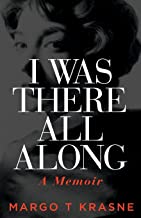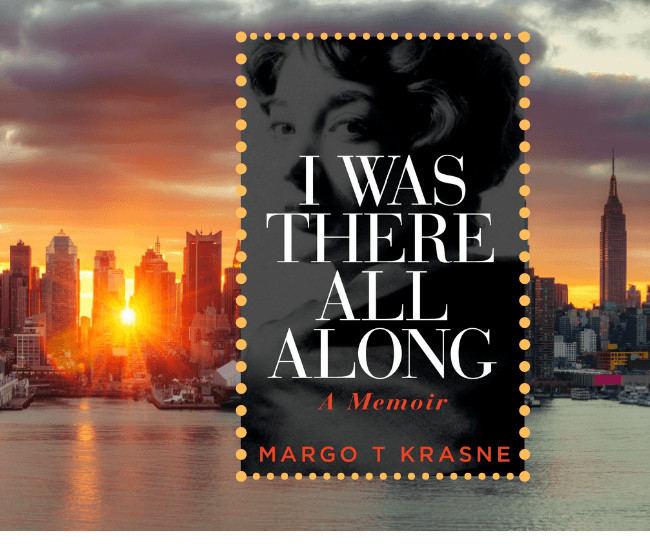I Was There All Along
Margo T Krasne, a young actress wannabe, had been invited by a friend to see the new Elaine May and Mike Nichols Broadway show. They had great seats. Nichols seemed to notice their raucous laughs during the performance and at the curtain motioned them to come backstage. Next thing they knew, they were pinching themselves as they sat at a table at Sardi’s with the famed director.
Then what happened defies logic – and explanation. As Krasne describes it in her memoir, I Was There All Along (Simply Good Press): “Then, out of nowhere, Nichols turned on me. ‘You think you’re an actress? You’re nothing but some rich Jewish kid who thinks she can make it in the theater. Bet you can’t act at all.’ Nichols kept going at me until his venom was used up.”
Could this all be from a simple decision to wear a mink coat to the performance?
Anecdotes like these make I Was There All Along so heartfelt and so fun at the same time. These moments would tear the guts out of anyone, Krasne included. But how many people can so deftly put them into the words, force themselves to relive the experiences, and make them seem as much entertaining as downcast?
Krasne even makes her lifelong obsession with therapy a reader’s pleasure, from her drag-out quest to find the perfect therapist to the back-and-forth dialogue in the sessions themselves. Her goal is to understand why she constantly finds herself: struggling to settle on a career in the arts, finding harmony with friends and family, brushing up with celebrities, seeking perhaps a special someone, and doing all she can to merely to survive the last 50 years navigating life in New York.
The night before the wedding of a high school friend Janey, she sits on her bed making a list of all the men she has slept with. This is a Sex in the City moment that could depress but works to amuse. This particular listicle reaches 27 over a period of six years. And she’s only 27.
What steals the scene is when she gets a call for Janey and coerces the soon-to-be bride to make her own count. Janey’s number also hits 27…until Krasne reminds her of one she has forgotten.
“But that was a one-night stand,” insists Janey.
“And what the hell do you think most of mine were?” the author slams back.
Krasne begins her story in the fall of 1986 with a great opening diatribe: “I was turning 49. Exhausted. Depleted. About to lose my home. Where the hell had it gone? I was supposed to be a somebody. I’d graduated from one of the best professional schools in the city—if not country. I’d run a department at a major advertising agency. Two of my sculptures were in a museum for Christ’s sake. And there I was—curled up in a chair staring out my window contemplating a leap.”
At a time when her mother has died, her cat has died and she sees herself as “a sculptor who no longer sculpts,” Krasne begins the process of finding a therapist. She has a strict set of requirements (for which she has another list). Although she can try out several (one day she actually books sessions with two different ones) and switch any time, the search is reminiscent of visiting prospective colleges with high school upperclassmen.
Readers learn about Krasne initially through the dialogue at her therapy appointments. She’ll discuss strained relationships with family members, the weird dynamics, her friends who come into and out of favor, her efforts to act, sculpt, sing, paint and perhaps live the Marjorie Morningstar life described in Herman Wouk’s classic novel.
Even Susanne, her therapist, takes on a major role in Krasne’s life, and is the subject of much exchange and reflection throughout the memoir. Krasne frequently punctuates Susanne’s comments with exclamation points, projecting, at least for me, a different tone and persona from the calm often associated with the profession.
In the course of her narrative, Krasne will come into contact with personalities such as Martha Graham, Sanford Meisner, David Susskind, Ira Levin, Phil Ramone and Suzanne Pleshette, to name a few – all in totally different contexts.
Not that it matters, but the author manages to draw in three locations – Riverdale, NY; Brookline, MA; and Syracuse University – that all have special meaning in my own life.
Krasne describes her first interaction with therapists while she is still living with her parents. “The thought of having someone’s ear who would listen, perhaps take me seriously, maybe even convince my parents I wasn’t nuts, sounded heavenly.”
Her father’s reaction? “I need to pay $25 for her to go complain about us?”
Eventually, she regains her desire and drive to sculpt. “I cannot be certain,” she writes, ‘if the clay was a means of artistic self-expression or if I couldn’t get arrested as an actress.”
Krasne’s career takes a turn when she builds a successful practice as a communications consultant. Even this has its ironies. In the process of being interviewed for an apartment, she freezes when asked a simple question by the co-op board – to the point where the head of the board asks, “You’re a communications coach and you can’t answer a question?”
You get the idea. Margo Krasne certainly has had her ups and downs. And she has a very intellectual yet playful way of writing about them. She has turned serious life issues into a therapeutic and envious romp through the city that never sleeps. Follow her world and life in this fascinating memoir, I Was There All Along, currently available for purchase.
Read our interview with Margo to learn more about the book, and visit her Author Profile page.
Buy this Book!
Amazon





Margo Krasne has written a gem of a book filled with wit, pathos and a gift for finding the irony and humor in her journey to self-acceptance. Readers are in for a wonderful ride through escapades, love, and loss. I found myself drawn to her authentic voice which resonated with determination and resolve. She tells her story with heart and grit.
A must read.
It really is a terrific story, all the more compelling for the truthfulness of the telling and the passion that informs it. I am fortunate to have actually met (and dined) with Margo, and she is as interesting, direct, observant and fascinating as her memoir. A book worth savoring and passing along!